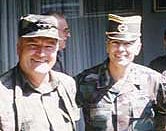
Repubs Attack Wesley Clark Over Photo With War Criminal
by Terence Sheridan
 |
by Terence Sheridan |
|
 (PNS) --
Only
a Republican who fears Wesley Clark could love Banja Luka, a drab town in the northwest corner of Bosnia and Herzegovina, a bankrupt nation of wary Muslims, Serbs and Croats.
(PNS) --
Only
a Republican who fears Wesley Clark could love Banja Luka, a drab town in the northwest corner of Bosnia and Herzegovina, a bankrupt nation of wary Muslims, Serbs and Croats.
In August 1994, during the height of the Bosnian civil war, Clark came to Banja Luka, met a Serb general and ended up looking like a perfect chump. The Serb, Ratko Mladic, suckered Clark into exchanging hats and posing for pictures. At the time, Clark was a three-star general and head of operations at the Pentagon. It seemed like a harmless lark at the time, two generals exchanging snappy covers and smiling for the camera. A few jokes, a few laughs, and then off to a lunch hosted by the Serb. But now Clark is running for president of the United States and Mladic, indicted for war crimes in 1995, is a fugitive with a $5 million U.S. price on his head, the Osama of the Balkans. He's wanted for crimes against humanity and genocide, dating from the siege of Sarajevo, beginning in April 1992, to the massacre of more than 7,000 Muslims in eastern Bosnia in July 1995. In between there were grotesque concentration camps. And since the Bush White House doesn't play nice, it seems likely that sooner or later the embarrassing pictures will surface prominently: the Democratic candidate cavorting with a barbarian, as opposed to pictures of the Republican president landing on a U.S. warship in a flight suit. The meeting between Mladic and Clark was arranged by General Michael Rose, the British commander of the United Nations Protection Force in Bosnia in 1994, at Clark's request. In his book, "Fighting For Peace," Rose wrote that Mladic first tongue-lashed Clark, then placated him with the hat exchange and that Clark "was clearly delighted to be offered some sort of olive branch." In addition, according to Rose, former commander of Britain's Special Forces and hero of the Falklands War, Mladic gave Clark a pistol with the engraved words, "From General Mladic." "We were appalled," Rose wrote. In his own book, "Waging Modern War," Clark makes no mention of either hats or a pistol while describing Mladic as "the blustering military leader of the Bosnian Serbs," and as being "coarse and boastful." So how did this vulgar piece of work manage to con a West Point graduate (first in his class) and Rhodes Scholar? Clark doesn't give a clue, but Rose does. Rose said he warned Clark, a man with a reputation for being headstrong and ego-driven, about the manipulative Mladic, but to no avail. "Sadly for Wes, Bosnia was not the Gulf War," Rose wrote. "The rules of the game were subtler, and he turned out to be ill-equipped to deal with the brutal cunning of a man like Mladic." But in 1999 Clark was a four-star general with a new hat and a new title, Supreme Allied Commander, Europe, when NATO, an alliance of 19 nations led by the United States, bombed defiant Serbs into resentful submission. Kosovo will doubtlessly be portrayed by the candidate as a foreign policy triumph. If you're inclined to ignore certain facts and Balkan subtleties, Clark, as Bill Clinton's general, saved Kosovo's blameless Albanians, punished Serbian forces, and brought peace to the valley. However, prior to the 78-day bombing campaign against decrepit Yugoslavia, a vicious but low-grade guerrilla war had ebbed and flowed for a year between Serbian security forces and separatist rebels in Kosovo, a Serbian province dominated by ethnic Albanians. Every time it ebbed, rebels would knock off a Serbian policeman and the security forces would go scorched-earth ballistic -- classic, clever guerrilla warfare with predictable international news coverage of the smoking aftermath. But, by far, the worst of the ruthless mass purges of the Albanian populace, the sea the rebels swam in, came after NATO launched Operation Allied Force in March 1999. NATO occupied the province that June and since then Serbs, Gypsies and other non-Albanian minorities have been killed, kidnapped and assaulted by Albanian nationalists, the former rebels, who systematically dynamite historic Serbian churches and monasteries in Kosovo while aiding and abetting armed ethnic mischief in neighboring Macedonia. There's simply no telling what can happen when waging modern war in crumbling countries with different values, and even morally superior ventures are rough on civilians. NATO aircraft mistakenly struck refugee convoys, hospitals, a passenger train, and the Chinese Embassy, but when the high-altitude "humanitarian" campaign ended, Serbian forces left Kosovo with their flags flying and nearly all their tanks intact. For the record, Clark got back his famous hat. Slobodan Milosevic, the supreme Serbian leader, returned it during the Bosnian peace negotiations in Dayton, Ohio, in November 1995, saying it was a gift from General Mladic. Headstrong and egocentric, Clark is also ambitious, bright, talented and tireless. He was often in hot water at the Pentagon and was forced into retirement only a month after the Serbs caved in. But look at him now. Milosevic is on trial for war crimes, Mladic is on the run, the Bush administration is bogged down in Iraq, and Clark is a decorated Vietnam veteran eager to take on a tough-talking war leader who never wore a flight suit into battle.
Albion Monitor
September 23, 2003 (http://www.albionmonitor.net) All Rights Reserved. Contact rights@monitor.net for permission to use in any format. |